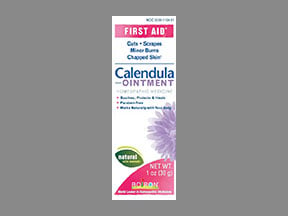
Calendula Coupons & Savings Card – Discount Prices from $4.46
My prescription
Edit
30GM, Calendula (1 Tube)
Select pharmacy

Albertsons
$4.46
COUPON PRICE
Walgreens
$4.46
COUPON PRICECalendula savings card
Show this card to your pharmacist
Albertsons
$4.46
BIN
ID
PCN
GRP
011867
LHFACC1090
HT
LABH001
Powered by
Price history for Calendula
1 Tube, 30GM
Average retail price for Calendula
Average SaveHealth price for Calendula
Our price history data is based on aggregated prescription data collected from participating pharmacies in America. Our prescription data updates daily to reflect the latest price changes. If you notice a missing data point, it means there wasn't sufficient data available to generate a monetary value for that date.
*Retail prices are based on pharmacy claims data, and may not be accurate when we don't have enough claims.
Calendula dosage forms
Dosage Quantity Price from Per unit 30GM 1 Tube $6.44 $6.44 30GM 2 Tubes $10.87 $5.43 30GM 3 Tubes $15.31 $5.10 45GM 1 Tube $6.44 $6.44 45GM 2 Tubes $10.87 $5.43 45GM 3 Tubes $15.31 $5.10 70GM 1 Tube $9.01 $9.01 70GM 2 Tubes $16.01 $8.01 70GM 3 Tubes $23.02 $7.67
| Dosage | Quantity | Price from | Per unit |
|---|---|---|---|
| 30GM | 1 Tube | $6.44 | $6.44 |
| 30GM | 2 Tubes | $10.87 | $5.43 |
| 30GM | 3 Tubes | $15.31 | $5.10 |
| 45GM | 1 Tube | $6.44 | $6.44 |
| 45GM | 2 Tubes | $10.87 | $5.43 |
| 45GM | 3 Tubes | $15.31 | $5.10 |
| 70GM | 1 Tube | $9.01 | $9.01 |
| 70GM | 2 Tubes | $16.01 | $8.01 |
| 70GM | 3 Tubes | $23.02 | $7.67 |
Calendula Warnings
Calendula Side Effects
Calendula, commonly known as pot marigold, is generally considered safe for most individuals when used appropriately. However, certain precautions should be observed to minimize potential side effects. Individuals with allergies to plants in the Asteraceae/Compositae family—such as ragweed, chrysanthemums, daisies, and marigolds—may experience allergic reactions to calendula. Symptoms can include skin irritation, redness, or swelling. If you have known sensitivities to these plants, it's advisable to consult a healthcare provider before using calendula products. Pregnant women should avoid consuming calendula orally, as it may pose risks during pregnancy. The safety of topical application during pregnancy is not well-established, so it's best to err on the side of caution and avoid use. Similarly, due to insufficient information regarding its safety during breastfeeding, nursing mothers are advised to refrain from using calendula. Calendula may cause drowsiness and slowed breathing. Combining it with sedative medications could enhance these effects, potentially leading to excessive sleepiness or respiratory issues. If you're taking sedatives, consult your healthcare provider before incorporating calendula into your regimen. As with any herbal supplement, it's important to use calendula responsibly and under the guidance of a healthcare professional, especially if you have existing health conditions or are taking other medications.
Calendula Interactions
Calendula, commonly known as pot marigold, is a plant often used in herbal remedies. While generally considered safe for most individuals, it's important to be aware of potential interactions with certain medications and conditions.
One notable interaction involves sedative medications, also known as central nervous system (CNS) depressants. Calendula may cause drowsiness and slowed breathing. When combined with sedative drugs—such as Clonazepam, Lorazepam, Phenobarbital, or Zolpidem—there's a risk of enhanced sedative effects, leading to excessive sleepiness or breathing difficulties. Therefore, it's advisable to exercise caution and consult a healthcare provider before using calendula alongside these medications.
Additionally, individuals with allergies to plants in the Asteraceae/Compositae family—which includes ragweed, chrysanthemums, marigolds, and daisies—may experience allergic reactions to calendula. Symptoms can range from skin irritation to more severe allergic responses. If you have known sensitivities to these plants, it's prudent to avoid calendula or seek medical advice before use.
Pregnant women should avoid taking calendula orally, as it is considered likely unsafe due to concerns that it might cause miscarriage. Topical use during pregnancy is also best avoided until more information is available. For breastfeeding mothers, there isn't enough reliable information to determine the safety of calendula use; thus, it's recommended to err on the side of caution and avoid its use during this period.
In summary, while calendula offers various traditional uses, it's essential to be mindful of its potential interactions and contraindications. Always consult with a healthcare professional before incorporating calendula into your regimen, especially if you are taking sedative medications, have plant allergies, are pregnant, or are breastfeeding.
What is calendula used for?
Calendula is commonly used for its potential anti-inflammatory, antiseptic, and healing properties. It is often applied topically to help with minor wounds, skin irritations, and burns. Additionally, calendula may be used in creams or ointments to soothe conditions like eczema or dermatitis.
What is Calendula ointment used for?
Calendula ointment is commonly used for its soothing and healing properties. It is often applied to minor cuts, burns, and skin irritations to promote healing and reduce inflammation. Additionally, it may be used to alleviate symptoms of eczema and dermatitis due to its anti-inflammatory and antimicrobial effects.
What is the medicinal use of marigold?
Marigold, particularly the Calendula officinalis species, is commonly used in herbal medicine for its anti-inflammatory, antiseptic, and wound-healing properties. It is often applied topically in creams or ointments to help treat minor cuts, burns, and skin irritations. Additionally, marigold may be used to soothe skin conditions such as eczema and dermatitis.
